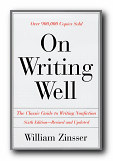sample from HTML program and PDF book
1. Narratives are accounts that describe a sequence of events. When answering questions which concern events in a sequence, you should avoid drifting into merely retelling the ‘story of what happens’. This is called narrative paraphrase. This feature often occurs in fiction, poetry, drama, history, film, politics, or anything else which involves events which take place over a span of time.
2. The temptation to retell the story will always be strong, for two reasons:
- it is always a lot easier than answering the question
- it gives you the feeling that you are answering the question – when you are not
3. Remember that almost all essay questions require that you construct an argument which should be illustrated by evidence and examples drawn from your study materials. It is not enough merely to retell a story.
4. Select that one incident, character, event, or phrase which illustrates the point of your argument, then stop! You should resist the temptation to discuss ‘what happens next’.
5. If you discover on re-reading your essay that it is full of phrases such as ‘and then he…and then she … following this they … and then next they’ – something is likely to be wrong. Pick out the one point which provides the evidence you require, and eliminate the rest.
6. Obviously, if a question asks you to discuss a succession of events, you would normally deal with them in the sequence that they occur. Even in such cases however, you should keep in mind that merely recounting them as a narrative does not constitute discussion, analysis, or evaluation.
7. If the question asks you to analyse a series of events, you should split the account into its most important topics. Each one of these elements might be identified in turn – and then analysed. Resist the temptation to get caught up into the ‘story’.
8. Essays dealing with history or political issues of the past are normally and most logically written in the past tense.
Within six weeks of the revolution Cossack armies and other ‘white’ forces were already mustering in south-eastern Russia; the Ukraine, egged on by French and British promises, was in a state of all but open hostilities against the Soviet power; the Germans, in spite of the armistice, were a standing threat in the west.
E.H. Carr, The Bolshevik Revolution 1917-1923: Volume One, Penguin: 1984, p.167
9. Some people try to give a sense of vividness or urgency to their writing by re-casting narratives in the present tense. The result can seem modish and posturing. This should be avoided in academic writing.
Here is the last example, re-cast into what’s called the ‘dramatic present’ tense.
Within six weeks of the revolution Cossack armies and other ‘white’ forces are already mustering in south-eastern Russia; the Ukraine, egged on by French and British promises, is in a state of all but open hostilities against the Soviet power; the Germans, in spite of the armistice, are a standing threat in the west.
© Roy Johnson 2003
Buy Writing Essays — eBook in PDF format
Buy Writing Essays 3.0 — eBook in HTML format
More on writing essays
More on How-To
More on writing skills

 Laurel Alexander, Education & Training on the Internet: An essential source for students, teachers and education providers, Plymouth: Internet Handbooks, 2000, pp. 192, IBSN 1840253460. Guide to online resources for students and tutors. Exstensive listings of online courses in UK and abroad.
Laurel Alexander, Education & Training on the Internet: An essential source for students, teachers and education providers, Plymouth: Internet Handbooks, 2000, pp. 192, IBSN 1840253460. Guide to online resources for students and tutors. Exstensive listings of online courses in UK and abroad.